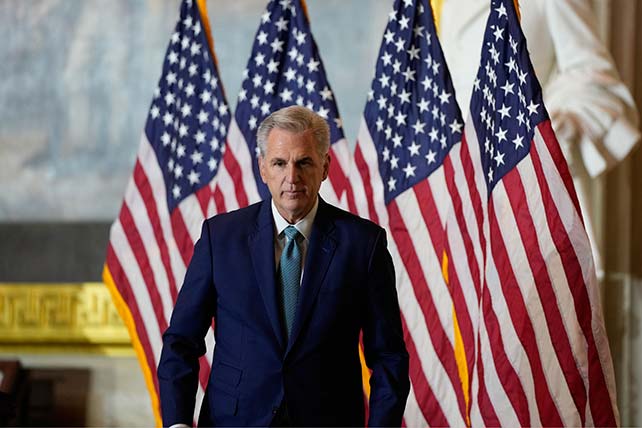WASHINGTON (AP) — The COVID-19 vaccine mandate for members of the U.S. military would be rescinded under the annual defense bill heading for a vote this week in Congress, ending a directive that helped ensure the vast majority of troops were vaccinated but also raised concerns that it harmed recruitment and retention.
Republicans, emboldened by their new House majority next year, pushed the effort, which was confirmed Tuesday night when the bill was unveiled. House GOP leader Kevin McCarthy personally lobbied President Joe Biden in a meeting last week to roll back the mandate.
Rep. Mike Rogers of Alabama, the ranking Republican on the House Armed Services Committee, said the removal of the vaccination requirement was essential for the defense policy bill to move forward.
RELATED: Navy Barred From Acting Against Religious Vaccine Refusers
“We have real recruitment and retention problems across all services. This was gas on the fire exacerbating our existing problem,” Rogers said. “And the president said, you know, the pandemic is over. It’s time for us to recognize that and remove this unnecessary policy.”
White House press secretary Karine Jean-Pierre said Monday that Biden told McCarthy he would consider lifting the mandate but Defense Secretary Lloyd Austin had recommended it be kept.
“I would remind all of you that the Pentagon has a range of vaccines it has long required,” Jean-Pierre said Monday. “So this is nothing new.”
The vaccine provision is one of the more acrimonious differences in the annual defense bill that the House is looking to wrap up this week and send to the Senate. It sets policy and provides a roadmap for future investments. It’s one of the final bills Congress is expected to approve before adjourning, so lawmakers are eager to attach their top priorities to it.
Service members and the Defense Department’s civilian workforce would get a 4.6% pay increase, according to a summary of the bill released Tuesday night. The legislation also requires a review of the rate of suicide in the Armed Forces since Sept. 11, 2001, broken down by service, occupational specialty and grade. It also requires the defense secretary to rescind the COVID-19 vaccination mandate.
RELATED: Tony Evans Shares His View on Vaccine Mandates, Says COVID Is About ‘Something Bigger’
Military leaders acknowledge that the vaccine requirement is one of several factors contributing to their recruiting struggles. It may dissuade some young people from enlisting, but officials don’t know how many. This year the Army missed its recruiting goal by about 25%, while the other services scraped by.
The reasons, however, are complex. Two years of the pandemic shut off recruiters’ access to schools and events where they find prospects, and online recruiting was only marginally successful. Finding recruits is made more difficult by the ongoing nationwide labor shortage and the fact that only about 23% of young people can meet the military’s fitness, educational and moral requirements — with many disqualified for medical issues, criminal records, tattoos and other things.
A congressional aide familiar with the negotiations but not authorized to speak publicly said lawmakers supportive of the vaccine mandate concluded that it had accomplished what it was intended to do by achieving a high rate of vaccination throughout the service branches, and that meeting the Republican demands to rescind it would allow other priorities to advance.
The mandate was enacted through an August 2021 memorandum from Austin. It directed the secretaries of the various military branches to begin full vaccination of all members of the Armed Forces on active duty or in the National Guard or Reserve. They have not been required to also receive boosters.
RELATED: Mohler, Graham, and Others React to SCOTUS Decision Halting Vaccine Mandate
Asked about the matter over the weekend, Austin told reporters he still supports the vaccine for U.S. troops.
“We lost a million people to this virus,” Austin said. “A million people died in the United States of America. We lost hundreds in DoD. So this mandate has kept people healthy.”
As of early this month, about 99% of the active-duty troops in the Navy, Air Force and Marine Corps had been vaccinated, and 98% of the Army. Service members who are not vaccinated are not allowed to deploy, particularly sailors or Marines on ships. There may be a few exceptions to that, based on religious or other exemptions and the duties of the service member.
The vaccination numbers for the Guard and Reserve are lower, but generally all are more than 90%.
More than 8,000 active-duty service members were discharged for failure to obey a lawful order when they refused the vaccine.
The Marine Corps, which is much smaller than the Army, Navy and Air Force, vastly outpaces them in the number of troops discharged, with 3,717 as of early this month. The Army – the largest service — has discharged more than 1,800, while more than 1,600 were forced out by the Navy and 834 by the Air Force. The Air Force numbers include the Space Force.
The military services came under fire over the past year for approving only a limited number of religious exemptions to the vaccine requirement.
Military leaders have argued that troops for decades have been required to get as many as 17 vaccines in order to maintain the health of the force, particularly those deploying overseas. Recruits arriving at the military academies or at basic training get a regimen of shots on their first day — such as measles, mumps and rubella — if they aren’t already vaccinated. And they routinely get flu shots in the fall.

